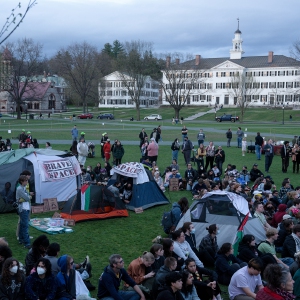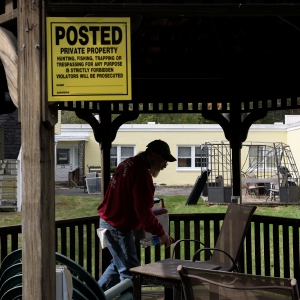Dartmouth faculty call for more staff amid Arts & Sciences reorganization
| Published: 11-07-2023 3:51 AM |
HANOVER — As Dartmouth College leaders consider a large-scale organizational change to the departments of Arts and Sciences, members of the faculty have made their own voices heard in a show of support for the college’s staff who fill non-academic positions.
Wages for staff that lag behind those of peer institutions have helped leave the departments “with a skeleton crew,” reads a letter published late last month, undersigned by 250 members of the faculty — from postdoctoral fellows to full professors.
While student and faculty numbers have ballooned in the past two decades, since 2004, there are 105 fewer staff in the Arts and Sciences, and the administrative and advancement offices.
The asynchronous institutional growth of this period has stretched staff “to the breaking point,” the letter reads.
There are 124 fewer employees since that time across the college as a whole, including graduate and professional programs.
Meanwhile, there are more than 1,000 additional students in total at Dartmouth, and 186 more faculty.
It’s been a “death by a thousand cuts” situation, said Christopher Sneddon, a professor in the departments of geography and environmental studies.
During the COVID pandemic, it was “amazing feats” by staff to ensure that faculty were still able to teach, Sneddon said.
Article continues after...
Yesterday's Most Read Articles
 Police seek assistance in locating missing Dartmouth student
Police seek assistance in locating missing Dartmouth student
 City cites Claremont property owner over demolition of building
City cites Claremont property owner over demolition of building
 Editorial: Dartmouth lets protesters know where they stand
Editorial: Dartmouth lets protesters know where they stand
 DHMC union organizers say they have enough signatures to force vote
DHMC union organizers say they have enough signatures to force vote
 A Life: Elaine Chase ‘was a very generous person’
A Life: Elaine Chase ‘was a very generous person’
Further, staff are on the “front lines” of student support, he said. “They’re helping (students) navigate the electronic bureaucracy of Dartmouth, making sure they know where there classes are, whether or not there are spaces in those classes.”
When staff in roles such as information technology, facilities and events can’t fully perform, the problem is felt across the college as a whole, the letter contends. Scholarship is “jeopardized,” it reads, when clerical and organizational tasks “are reassigned to faculty members in the absence of critical staff professionals.”
The letter, signed by more than a third of the faculty at Dartmouth, “is a really clear statement ... that we don’t feel like our staff partners are being given the tools that they need to do what they’re being asked of them, and what the college is being asked of them,” said Bethany Moreton, a professor in the history department.
Staffing challenges are compounded by elevated housing, child care and elder care costs in the Upper Valley. While Grafton County rental housing costs have increased nearly 50% in five years, according to a 2022 report from the New Hampshire Housing Finance Authority. For staff at Dartmouth, “wages lag far behind,” the letter reads.
Staff, as compared to faculty, are paid “dramatically” less than their counterparts at peer institutions, the letter emphasized, which stands in “marked contrast to the competitive pay and benefits that attract faculty and administrators to the Upper Valley.”
The college has been aware of the issue for years.
Moreton recalled a 2018 departmental review, in which an external committee said the History Department’s reliance on “1.5 staff” was unsustainable (that’s the equivalent of one full-time and one part-time staff member), and recommended increasing staff to 2.5 people.
“In the period in which the staff level was held to 1.5, the number of faculty more than doubled, from 12 to 29,” she said. “Today, we are down to a single staff member.”
While Dartmouth recently announced 15 new staff hires across all offices, that number is “not nearly enough” to fill in the gaps, said Pamela Voekel, also a professor in the history department.
As for the comparatively poor compensation, Dartmouth is a “place with a robust endowment,” Voekel said. “They pay faculty well. I’m happy to admit that. So the staff should also be well paid. These are people that are really good at their job, and are being driven to the breaking point.”
A team of faculty signatories to the letter are scheduled to meet with Dartmouth President Sian Beilock, Dean of the Faculty of Arts and Sciences Elizabeth Smith, and Provost David Kotz next week to discuss the concerns about compensation and under-staffing, Moreton said.
Dartmouth declined to comment on the letter, as it’s “a faculty communication,” said college spokeswoman Diana Lawrence.
The missive came amid broader internal conversations about the organization of the Arts and Sciences departments.
Currently, Dartmouth’s undergraduate departments of Arts and Sciences are lead by a dean of faculty, who reports to the president, and a dean of the college, who reports to the provost.
Unlike most peer institutions staffing, admissions and fundraising decisions within Arts and Sciences must be run through Dartmouth’s central administration, which also is responsible for distributing a monetary allowance raised from tuition and philanthropy back to the departments.
The structure as it is now makes it more difficult for faculty and staff to work together, and “doesn’t incentivize innovation or cross-institutional collaboration,” the college’s website reads.
In 2022, former Dartmouth President Phil Hanlon began the conversations about re-organizing. An official recommendation is set to be announced this winter.
An organizational shift at Dartmouth could give some purchase to the demands in last week’s letter.
Putting control of Arts and Sciences funding in the hands of the departments — which in a potential model, would be lead by a single leader who reports to either the president or the provost — would make it easier for faculty and staff to advocate for their own needs, said Nina Pavcnik, a professor of international relations at the college, at an online forum last week regarding the potential changes.
Wages that haven’t kept up with inflation, on top of the high cost of living in the Upper Valley, have also impacted the more than 400 Dartmouth employees in service and maintenance jobs across the school.
But members of that group, represented by the Local 560 chapter of the Service Employees’ International Union, have more negotiating power, said Chris Peck, Local 560 president. Staff in the Arts and Sciences aren’t unionized.
“If they’re interested, we’d sure love to organize them,” Peck said.
Frances Mize is a Report for America corps member. She can be reached at fmize@vnews.com or 603-727-3242.

 Developer seeks to convert former Brookside nursing home to apartments
Developer seeks to convert former Brookside nursing home to apartments
